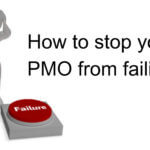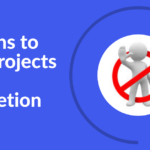If you have worked in change. Run a project. Managed a PMO; you will be fully aware that it is not an easy job! Managing and implementing change is hard, partly due to the fact that most humans do not like change and will do all they can in order to maintain the status quo.
The way humans have become programmed over the vast distance of time results in the automatic reaction to change to be to go into defence mode – fight or flight (see article Are you in control of your actions).
This natural reaction can lead to the unconscious or even conscious use of perception to discredit the project or PMO. Even worse this can be extended to the person, which could be you!
Power of Perception
Perception is funny. It is a powerful tool that helps interpret and decode the raw information that bombards us through out each and everyday.
What this also means is that if it is the key used to help us make sense of events, it means that by altering the way the key decodes, can alter the perception we or others have of a particular event or situation.
Have you ever been in a meeting where perhaps the project is not going 100% to plan but in general there are only minor concerns. Then someone makes a statement that changes the way the information is decoded so that what was minor is suddenly a show stopper? This action has changed the perception of everyone in the room and you as the project manager you suddenly find yourself on the back foot and credibility of the project or yourself in a weaker position?
It does not matter if what was said was true. If it was delivered in a credible manner, the perception becomes the new reality. What is worse, if you do not address this new reality and correct the message, you are at serious risk of perception killing your project or PMO.
Perception Management Plan
1. Understand the power of perception
Like with so many things in life, having the knowledge what can happen and being observant means you can take action. If you did not know the impact before this article, you do now!
2. Address concerns
Many people leave concerns that others have until it is too late and the concern, the perception has become reality. Be observant to stakeholders and if you sense they are getting concerned, take time to meet with them and, in a nice way, ask them about the concerns.
At times you may need to be direct as some people do not like to be confronted. However, if statements have been made, you should ask them to share why they are concerned and then you can work through them together.
See How to stop your PMO from failing for more ideas.
3. Do not be defensive
It is very important that when somebody is making incorrect statements, especially in a meeting with others in attendance, that you do not become overly defensive. Take on-board the information, acknowledge / play back your understanding of what they have said and then restate your position. You may need to change how you deliver the information as the change in perception may be an innocent misunderstanding.
4. Admit when you are wrong
Linked to point 3, it is important to listen as you may realise you have missed something. If this is the case, admit you are wrong quickly. This will build your reputation on doing what is right and, when you do hold your position, people will have more trust.
5. Build credibility
We all are all only as good as the credibility that we establish. It is our brand. So by each and every day doing what is right and delivering results will keep growing credibility. The higher the credibility, the less risk of being side swiped by perception.
IMPORTANT: if you have built a good level of credibility, please do not use this as a weapon to turn perception against others when it is not deserved or true.
6. Build support
There are times when you may face some senior stakeholders who have a wider agenda to change perception and you may just be the collateral damage as part of a bigger game. It is good to be aware of this as this will allow you to work with other senior stakeholders to build trust and support.
Again this should be based on the truth not a manipulation of the truth.
Summary
Perception is a real threat to the success of projects and PMO’s. Being aware of the impact and then using the strategies above can help you avoid having your project killed by perception.






